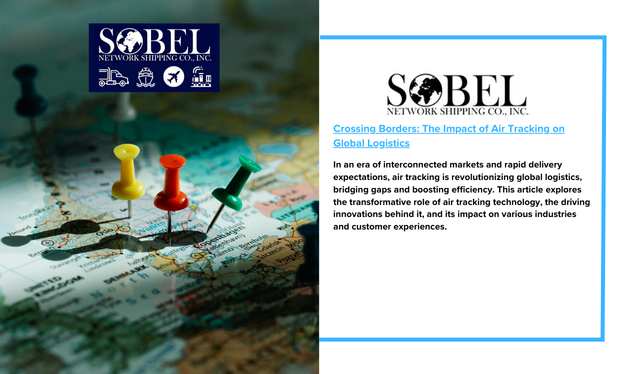In an era of interconnected markets and rapid delivery expectations, air tracking is revolutionizing global logistics, bridging gaps and boosting efficiency. This article explores the transformative role of air tracking technology, the driving innovations behind it, and its impact on various industries and customer experiences.
1. Air Tracking: A New Standard in Global Logistics
Air tracking technology offers real-time insights into the location, movement, and conditions of cargo during transit. Previously, tracking capabilities were limited to checkpoints at airports, leading to extended periods of uncertainty. Today, innovations in GPS, IoT, and data analytics enable logistics providers to offer near-constant updates across borders, benefiting manufacturers, retailers, and consumers alike.
2. Technology Advancements Fueling Modern Air Tracking
Key technological advancements are driving the evolution of air tracking:
- Internet of Things (IoT): IoT devices, such as GPS sensors and environmental monitors, track cargo continuously, collecting data on location, temperature, humidity, and impact.
- Blockchain for Security: Blockchain technology provides a tamper-proof, transparent record of tracking data, ensuring data integrity and compliance, particularly vital for high-value and sensitive items like pharmaceuticals.
- Machine Learning and Predictive Analytics: By analyzing historical data, machine learning algorithms predict arrival times, optimize routes, and detect delay patterns, allowing logistics providers to anticipate disruptions and respond with contingency plans.
3. Key Benefits of Air Tracking in Logistics
Air tracking technology has far-reaching benefits for supply chains, supporting businesses and enhancing customer satisfaction.
- Enhanced Visibility: Continuous tracking from origin to destination reduces status inquiries and instills confidence in delivery times for stakeholders.
- Operational Efficiency: Real-time data helps logistics providers streamline operations, reduce airport idle times, and optimize warehouse management, ultimately cutting operational costs.
- Customer Satisfaction: E-commerce businesses, in particular, benefit from air tracking as it allows them to provide accurate delivery updates, enhancing customer trust.
- Risk Mitigation: By monitoring environmental conditions, air tracking ensures safe transport for sensitive goods, minimizing risks for perishable items, electronics, and pharmaceuticals.
4. Industry Applications of Air Tracking
Air tracking is transforming various sectors by offering tailored solutions for specific needs:
- Pharmaceuticals: The industry uses air tracking to maintain temperature-sensitive drugs and vaccines. Continuous monitoring prevents spoilage, ensuring regulatory compliance and quality in global vaccine distribution.
- Electronics: The fragile nature of electronics makes them susceptible to shock and vibration. Air tracking helps monitor these factors, protecting sensitive cargo.
- Perishables: IoT-based air tracking alerts shippers when environmental parameters exceed set thresholds, allowing interventions to prevent spoilage for goods like food and flowers.
- Luxury Goods: For high-value items such as jewelry and designer apparel, air tracking enhances security and ensures a safe chain of custody from origin to delivery.
5. Challenges in Implementing Air Tracking Technology
While air tracking offers numerous advantages, challenges remain, especially in data management, regulatory compliance, and cost.
- Data Management: The volume of data generated by IoT devices requires robust infrastructure to integrate and interpret data effectively.
- Privacy and Compliance: Cross-border data transfers necessitate compliance with international data protection laws, adding complexity, particularly when working with third-party carriers.
- Implementation Costs: Installing tracking devices and maintaining infrastructure can be costly, especially for smaller logistics companies.
6. The Future of Air Tracking in Global Logistics
Emerging advancements in AI, 5G, and blockchain promise even greater capabilities for air tracking in the near future:
- 5G Connectivity: With the spread of 5G, data transfer speeds will increase, ensuring real-time tracking updates even in remote locations.
- AI-Powered Analytics: AI will enhance air tracking by analyzing data in real-time to provide predictive insights, such as identifying potential disruptions from adverse weather and recommending alternate routes.
- Blockchain for Track-and-Trace: Blockchain technology will add transparency by securing records of each cargo’s journey, reducing fraud, and enabling greater traceability for high-value shipments.
7. A New Era for Global Logistics
As air tracking technology continues to evolve, it is reshaping logistics, enhancing transparency, operational efficiency, and product integrity. From pharmaceuticals to luxury goods, businesses across industries leverage air tracking to optimize their supply chains and offer customers unmatched reliability and visibility.
Looking ahead, businesses that adopt air tracking will be well-positioned to meet the demands of global logistics, staying ahead in efficiency and customer satisfaction. As technology advances, air tracking will undoubtedly push the boundaries of what’s possible, bringing logistics into a new, more connected future.


